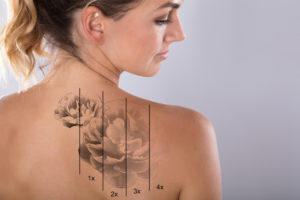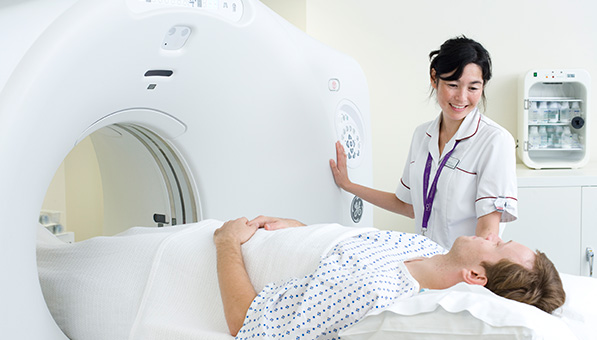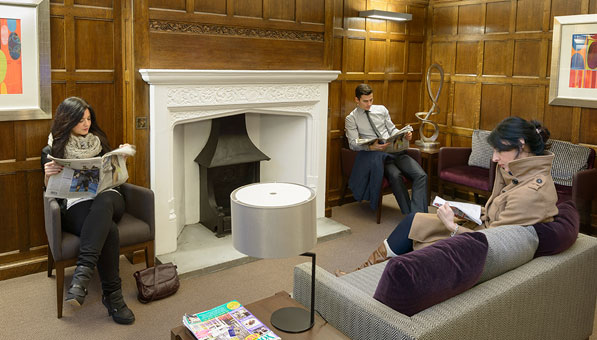Laser Tattoo Removal London
Safe & Effective tattoo removal
The Devonshire Clinic provides laser tattoo removal to patients in London and across the UK. Tattoos are designed to be permanent pieces of body art. The pigments used are injected deep into the lower layers of the skin, where they are held in place by a network of collagen fibres. This makes the physical removal of tattoos complex and damaging to the surrounding tissue, with the potential to cause extensive scarring. Laser tattoo removal can remove a tattoo with minimal risk and long-term scarring.
Tattoos are designed to be permanent pieces of body art. The pigments used are injected deep into the lower layers of your skin, where they are held in place by a network of collagen fibres. This makes the physical removal of tattoos complex and damaging to the surrounding tissue, with the potential to cause extensive scarring.
We offer laser tattoo removal which can remove a tattoo with minimal risk to damage or long-term scarring. Our laser tattoo removal appointments are carried out at our London skin clinic near Harley Street.
How does laser tattoo removal work?
Laser tattoo removal uses short pulses of high energy light to heat up and break down the tattoo pigments into smaller particles, which are then removed by your own immune system. It does not involve cutting into the skin and so does not cause scarring.
Our Consultant Dermatologists are experts in using medical dermatological lasers to perform many procedures, including laser tattoo removal. The Devonshire Clinic ensures that your procedure is carried out in a safe and controlled environment.
About the lasers we use to remove tattoos
Older lasers had a poor reputation for causing scarring because they overheated the skin around the tattoo site. Modern lasers have eliminated this problem.
Tattoo removal conducted at our London clinic is performed using a state-of-the-art Q-switched Nd YAG laser, which causes less heating in the surrounding skin tissue and which therefore carries a much lower risk of scarring.
Please note that even with the best laser equipment, green, yellow and orange pigments are often resistant to treatment and so we may not be able to completely remove your tattoo if it is rich in these pigments.
How long does laser tattoo removal take?
There is no standard tattoo, so there is no standard treatment time, but as a rule, the simpler the tattoo, the fewer treatments will be required. For example, a small tattoo with simple pigments can take anything from 1-10 treatments, whereas more complex tattoos can take up to 20 removal treatments or more.
The process is lengthened by the need to wait for the previous treatment to heal before your next round. This can take four to six weeks, extending the average tattoo removal process to around a year or more in some cases.
We are able to give you an estimate for the number of treatments your tattoo will require, based on a personal examination, but even then, we will not be able to say for certain until we see how your individual tattoo and skin type responds.
Does laser tattoo removal hurt?
The pain level of laser tattoo removal varies from person to person, from a slight stinging sensation to a more uncomfortable burning. However, tattoo removal is somewhat less painful than having the original tattoo.
Will I be left with a scar?
The treated area is likely to blister and scab following each laser removal treatment, and the skin around the treatment area may appear shiny for a few weeks. Both effects are temporary and will fade, but you will not be able to have further treatment until your skin recovers.
Laser tattoo removal is unlikely to leave a permanent scar, although there is a risk that the surrounding skin may be left with less natural colouring. The natural pigment may recover after a few months, or even years, but in some cases, this de-pigmentation may be permanent.
Is laser tattoo removal safe?
Laser tattoo removal is a well established and safe procedure if it is performed by professionals with the very latest equipment. Thousands of laser tattoo removal treatments have been supervised by Dr. Perrett alone and millions more are performed worldwide every year.
How does laser tattoo removal work?
Laser tattoo removal uses short pulses of high-energy light to heat up and break down the tattoo pigments into smaller particles, which are then removed by your immune system. It does not involve cutting into the skin and does not cause scarring. Our Consultant Dermatologists are experts in using lasers to perform many procedures, including laser tattoo removal. The Devonshire Clinic ensures that your procedure is carried out in a safe and controlled environment.
Our professional-grade tattoo removal lasers
Older lasers had a poor reputation for causing scarring because they overheated the skin around the tattoo site. Modern lasers have eliminated this problem. Tattoo removal conducted at our London clinic is performed using a state-of-the-art Q-switched Nd YAG laser, which causes less heating in the surrounding skin tissue and which therefore carries a much lower risk of scarring. Please note that even with the best laser equipment, green, yellow, and orange pigments are often resistant to treatment, so we may not be able to completely remove your tattoo if it is rich in these pigments.
The benefits of laser tattoo removal
If you have an unwanted tattoo, you may wish to consider laser tattoo removal as a treatment option. The benefits of laser tattoo removal include, but are not limited to, the following:
- Minimal Scarring – The lasers used in this procedure are designed to leave healthy skin cells alone, meaning that the potential for scarring is relatively low.
- Effective Fading – Laser tattoo removal treatment can effectively diminish the appearance of unwanted tattoos without any long-term, damaging effects.
- Minimal Recovery – There are minimal side effects of laser tattoo removal. After treatment, you may experience a small amount of tenderness and redness, which should only last a few days.
- Safe Method – If you’re looking to have a tattoo removed, laser tattoo removal is one of the safest ways to accomplish it. The risk of infection is minimal and so are side effects.
How long does laser tattoo removal take?
There is no standard tattoo, so there is no standard treatment time, but as a rule, the simpler the tattoo, the fewer treatments will be required. For example, a small tattoo with simple pigments can take one to 10 treatments. In contrast, more complex tattoos can take up to 20 removal treatments or more. The process is lengthened by the need to wait for the previous treatment to heal before your next round. This can take four to six weeks, extending the average tattoo removal process to around a year or more in some cases. We can give you an estimate for the number of treatments your tattoo will require based on a personal examination.
What happens at the first treatment session?
During your first laser tattoo removal treatment session, the laser will pass over the tattoo as it targets and breaks down the ink below the skin’s surface. The skin will frost or blister and may swell slightly. Tiny pinpricks of blood may also appear. Frosting occurs due to tiny gas bubbles rising to the skin’s surface, enabling the breakdown of the tattoo’s pigment. It is harmless. After the treatment area has been covered by the laser, your tattoo will be wrapped to protect it.
Does laser tattoo removal hurt?
The pain level of laser tattoo removal varies from person to person, from a slight stinging sensation to a more uncomfortable burning. However, laser tattoo removal is less painful than getting a tattoo.
Will laser tattoo removal leave scarring?
The treated area is likely to blister and scab following each laser removal treatment. The skin around the treatment area may appear shiny for a few weeks. Both effects are temporary and will fade, but you will not have further treatment until your skin recovers. Treatment is unlikely to leave a permanent scar. However, there is a risk that the surrounding skin may be left with less natural colouring. The natural pigment may recover after a few months or even years, but sometimes, it won’t.
Is laser tattoo removal safe?
Laser tattoo removal is a well-established and safe procedure if professionals with the latest equipment perform it. Thousands of laser tattoo removal treatments have been supervised by Dr. Perrett alone, and millions more are performed worldwide every year.
Is it safe to swim after laser tattoo removal?
While it is perfectly safe to swim before laser tattoo removal, it is not recommended to swim immediately afterwards. It’s advised that patients wait at least 72 hours before swimming after laser tattoo removal treatment. We also suggest that patients try can refrain from getting the treatment area wet with water that may be too hot or unclean.
Contact The Devonshire Clinic Today
If you have a tattoo that you want to remove, the professional team at The Devonshire Clinic can help. Our laser tattoo removal appointments are carried out at our London skin clinic near Harley Street. They are supervised by our very own Dr. Perrett, who has led thousands of laser tattoo removal treatments over the years. In addition to laser tattoo removal, we offer a wide range of medical dermatology and cosmetic dermatology services. Contact us at our London clinic today if you have a general inquiry, are looking to schedule an appointment, or would like to refer a patient.

Enquire about
Laser Tattoo Removal London
Frequently Asked Questions Laser Tattoo Removal
During your laser tattoo removal, you’ll be given some anaesthetic cream to numb the area, so that you won’t feel pain during the procedure. Afterwards, the pain level varies from person to person. You might experience a stinging or burning feeling. You can use an ice pack to calm down any soreness, and a cream such as aloe vera gel or petroleum jelly (such as Vaseline) to help with healing.
Costs of laser tattoo removal depend on how large it is and how many sessions you need to have.
The number of sessions you’ll need depends on the size of your tattoo. The simpler the tattoo, the fewer treatments are required. For example, smaller tattoos with simple pigments might take 1-10 treatments, while a more complex tattoo might take 20 treatments or more.
In most cases, the tattoo begins to fade after a few appointments. If your sessions are four to six weeks apart, which gives the previous treatment time to heal, you should start to see results a few months after your first appointment.
Energy produced by the laser heats up the tattoo, breaking the ink into minute fragments.These are reabsorbed into your bloodstream and pass out of the body.Removing a tattoo can take up to 10 or more sessions; in some cases, lasers lighten rather than completely removing it.However, this method of removing a tattoo is safe and involves minimal risk of long-term scarring.
Yes, laser tattoo removal works on any size of tattoo, but the bigger your tattoo, the more sessions you’ll need to remove it.
Risks of laser tattoo removal include some colours not completely disappearing. The skin around the tattoo may darken or lighten, although this is usually temporary. There’s also a minimal chance of permanent scarring (3 in 100 people). Avoid having tattoo removal if you’re pregnant, have a suntan, or a self-tan solution. Laser tattoo removal is considered safe if it’s carried out by professionals with the latest equipment. At The Devonshire Clinic, we have carried out thousands of tattoo removal treatments – and millions more are performed worldwide with minimal risks.
After your treatment, the area of skin treated by the laser may blister and swell slightly. It will be covered with a dressing to protect it. Wash the area twice daily with a gentle cleanser and then use a clean piece of cotton wool to apply petroleum jelly (such as Vaseline). Keep the treated area covered until the skin has completely recovered.
An alternative to laser tattoo removal is surgery or removal by excision. This means the affected skin area is removed and the remaining skin is restitched. Dermabrasion, another type of tattoo removal, involves a device that shaves skin layers so the ink can bleed out. It isn’t always effective and is a less popular choice. It can also aggravate sensitive skin.Some people try home treatments such as tattoo removal creams but there is little evidence that they work.
Most tattoos can be removed using laser treatment, but some can’t be removed completely and it’s common to have some marks left, as some colours don’t fade as well as others.
Read our
Patient Stories
I can’t recommend this clinic highly enough. The treatment I received for my skin cancer was first class
AL, LondonThe team at the Devonshire Clinic were excellent. From booking my appointments to every part of my treatment, I felt that I was in the very best hands.
CH, LondonBefore visiting the clinic I had quite high expectations, but I was blown away by just how brilliant the experience was. I felt like I was the only patient in the clinic. Simply the best medical treatment.
SF, London

